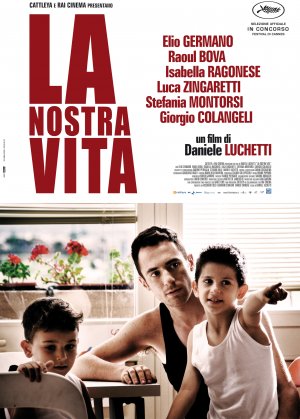
LA NOSTRA VITA
Italy, 2010, 98 minutes, Colour.
Elio Germano, Raoul Bova.
Directed by Daniele Luchetti.
An Italian slice of life from the socially conscious historical film of Italy in the 1960s and 1970s, My Brother is an Only Child. This time the film is socially conscious but not explicitly political.
A seemingly simple story of a builder, his love for his pregnant wife and their two boys, with plenty of loving scenes and extended family gatherings, becomes tragic and difficult with two quite diverse deaths. The husband has to cope with his children and opts for a financial focus to cover his grief. He is inexperienced and falls into difficulties with payments and finishing the apartment block he has undertaken to build.
This brings some darker aspects to life around sunlit Rome and Ostia.
Finance is never straightforward in Italy. There are always deals, corruption, illegal workers, migrant workers without papers, the demands of the building consortium, walkouts... We see them here. But, while the man is an ordinary type, he fights hard to succeed and is helped by his pimp neighbour and friend as well as his family solidarity.
An experience of Italian working class life, with some optimism despite grief and with a great emphasis on the worth of family and children.
1. Italy, contemporary, the working class, family?
2. The title, audiences identifying with it and the characters and their situations?
3. Ostia, the coast, city and country, homes, the building sites?
4. The musical score, contemporary tone, the importance of the song for Claudio and his wife, his crying out at the funeral?
5. The introduction to Claudio, his age, on site, energy, the boss, people liking him, the workers, his life and ambitions?
6. At home, with Elena, love, the song and their singing it, the loving relationship, pregnancy, the two boys, the spirit of the home, all together in the bed? The outings? Elena and her not wanting them to eat junk food, not being spoilt, play?
7. The family, extended? The brother, police, not married, the shared memories, the adults, the kids, employment and unemployment, difficulties in life, the family playing, eating together?
8. The drive, the labour pains, going to the hospital, Claudio and the boys cheerful, the sad news and the impact?
9. Claudio and his reaction, the funeral sequences, the song and the shout, the care of the boys, Vasco?
10. Celeste and the pimp, in the wheelchair, friendship, neighbours, getting the pay from the women? Their child? Arguments, Celeste minding the boys? Claudio asking the pimp for the money, his giving it? The attack by the gypsies, the danger? Celeste going? The boys and their wishing somebody to return – and her arrival?
11. The dead body, not reporting it? The consequences? Claudio and his hold over the boss? Andrei and his mother coming, asking, Claudio not telling? His feelings, friendship with the woman, sexual, fixing the café, organising the company for the roof, the visits?
12. Andrei, work, poor work, getting better, his being with the children, Claudio telling him the truth, the absent father and his feeling for him despite his not being good? Upset, the offer of the holiday, the back-pay?
13. The job, hard work, Claudio’s inexperience, the difficulties in paying the men, their walk-off? Going to his family, the gifts of money, his mother’s coins? Hiring the Italians, no union and contracts, finishing the job? Paying back the family?
14. Claudio as genial, the boss visiting the home and having the meal of linguini, playing with the boys, their seeing the crisis, but being together, Elena having paid for the holiday in Sardinia? Vasco walking? Overall joy?
15. The finale, the concert, its spirit, Andrei present?
16. The father and the three boys all together at the end – symbol of hope?